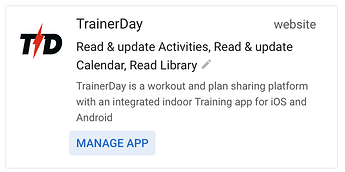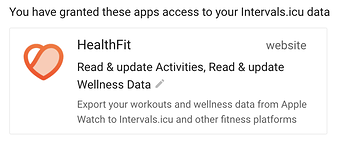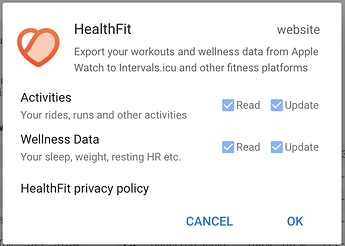Intervals.icu uses OAuth2 for authentication to the API. OAuth allows external applications to request authorization to access an Intervals.icu user’s data. It allows users to grant and revoke API access on a per-application basis and keeps user authentication details safe.
Creating An Application
Please mail the following info to david@intervals.icu:
- App name
- Description
- Website URL
- Logo image URL (square, at least 128x128)
- Privacy policy URL
- Redirect URI’s (http://localhost/ is always allowed)
- Your Intervals.icu ID (bottom of /settings page)
Once your application has been created your app will show up on the /settings page (only for you as the owner) and you can click “Manage App” to retrieve your client_id and secret, change redirect URL’s, configure webhooks and so on.
When your app is ready let me know and I will make it visible to all users.
Requesting Authorization To Access Intervals.icu Data For A User
Send the user to:
https://intervals.icu/oauth/authorize?client_id=<your client id>
&redirect_uri=<your redirect uri>
&scope=<required scopes>
&state=<optional data>
Intervals.icu will ask the user to login and display a confirmation dialog with options to choose which
scopes to grant the application. If the user confirms then they are redirected to the redirect_uri with an
authorization code and the optional state parameter:
<your redirect uri>?code=3983ed415f66413c890ca48b7cce59e4&state=...
If they decline:
<your redirect uri>?error=access_denied
Your server needs to exchange the code for an access token within 2 minutes by POSTing form data including your client_id and client_secret:
curl -X POST https://intervals.icu/api/oauth/token \
-d client_id=...
-d client_secret=...
-d code=3983ed415f66413c890ca48b7cce59e4
If all goes well Intervals.icu will respond with an access token, granted scopes and the id and name of the athlete:
{
"token_type": "Bearer",
"access_token": "d842c1fc25f241e5ae440d09756448a9",
"scope": "ACTIVITY:WRITE,WELLNESS:WRITE",
"athlete": {
"id": "2049151",
"name": "David (intervals.icu)"
}
}
To call the API use “Authorization: Bearer d842c1fc25f241e5ae440d09756448a9” header.
Note that you can use “0” for the athlete id for endpoints that accept an athlete id in the path. This will use the athlete for the bearer token used to make the call.
Scopes
Scopes are as follows:
- ACTIVITY: Completed rides, runs etc.
- WELLNESS: Weight, resting HR etc.
- CALENDAR: Planned workouts
- CHATS: Chats, groups and messages
- LIBRARY: Workout library
- SETTINGS: Athlete settings
For each scope specify READ or WRITE (to update, implies READ access) and use commas to separate multiple scopes. Example:
ACTIVITY:READ,WELLNESS:WRITE
Requests read access to activities and read and write access to wellness data.
Your Own Data
Note that you don’t need to do all this if you just want access to your own data. Use your API key to do that.


